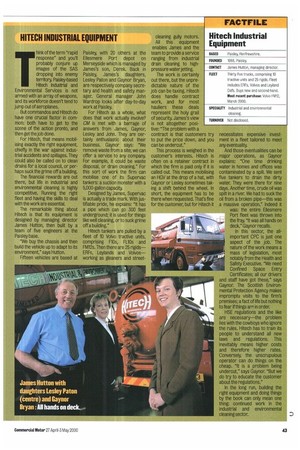HITECH INDUSTRIAL EQUIPMENT
Page 45

If you've noticed an error in this article please click here to report it so we can fix it.
Think of the term "rapid response' and you'll probably conjure up images of the SAS dropping into enemy territory Paisley-based Hitech Industrial and Environmental Services is not armed with an array of weapons, and its workforce doesn't tend to jump out of aeroplanes.
But commandos and Hitech do have one crucial factor in common: both have to get to the scene of the action pronto, and then get the job done.
For Hitech, that means mobilising exactly the right equipment, chiefly in the war against industrial accidents and spillages. They could also be called on to clean drains for a local council, or perhaps suck the grime off a building.
The financial rewards are out there, but life in industrial and environmental cleaning is highly competitive. Running the right fleet and having the skills to deal with the work are essential.
The remarkable thing about Hitech is that its equipment is designed by managing director James Hutton, then built by a team of five engineers at the Paisley base.
"We buy the chassis and then build the vehicle up to adapt to its environment," says Hutton.
Fifteen vehicles are based at Paisley, with 20 others at the Ellesmere Port depot on Merseyside which is managed by James's son, Derek. Back in Paisley, James's daughters, Lesley Paton and Gaynor Bryan, are respectively company secretary and health and safety manager. General manager John Wardrop looks after day-to-day work at Paisley.
For Hitech as a whole, what does that work actually involve? CM is met with a barrage of answers from James, Gaynor; Lesley and John. They are certainly enthusiastic about their business. Gaynor says: "We remove waste from a site; we can offer a service to any company. For example, it could be waste disposal, or drain cleaning." For this sort of work the firm can mobilise one of its Supervac tankers: a suction monster with a 5,000-gallon capacity.
Designed by James, Supervac is actually a trade mark. With justifiable pride, he explains: "It has a pipe which can go 300 feet underground; it is used for things like well cleaning, or to suck grime off a building," Hitech tankers are pulled by a fleet of 10 Volvo tractive units, comprising FlOs, FL1Os and EM12s. Then there are 25 rigidsERFs, Leylands and Volvos— working as gleaners and street cleaning gully motors. All this equipment enables James and the team to provide a service ranging from industrial drain cleaning to high pressure water jetting.
The work is certainly out there, but the unpredictable nature of the job can be taxing. Hitech does handle contract work, and for most hauliers these deals represent the holy grail of security. James's view is not altogether positive: "The problem with a contract is that customers try to put the price down, and you can be undercut."
This process is weighed in the customer's interests. Hitech is often on a retainer contract in which the firm is paid only if it is called out. This means mobilising an HGV at the drop of a hat, with Gaynor or Lesley sometimes taking a shift behind the wheel. In short, the equipment has to be there when requested. That's fine for the customer, but for Hitech it necessitates expensive investment in a fleet tailored to meet any eventuality.
And those eventualities can be major operations, as Gaynor explains: "One time drinking water in homes and offices was contaminated by a spill. We sent five tankers to drain the dirty water. They were there for nine days. Another time, crude oil was spilt in a river. We had to suck the oil from a broken pipe—this was a massive operation." Indeed it was: the entire Ellesmere Port fleet was thrown into the fray. "It was all hands on deck," Gaynor recalls.
In this sector, the allimportant CPC is just one aspect of the job. The nature of the work means a mass of legislation, most notably from the Health and Safety Executive. "We need Confined Space Entry Certificates; all our drivers and staff have got these," says Gaynor. The Scottish Environmental Protection Agency makes impromptu visits to the firm's remises; a fact of life but nothing 'to fear if things are in order.
HSE regulations and the like' are necessary—the problem lies with the cowboys who ignore the rules. Hitech has to train its people to understand all new laws and regulations. This inevitably means higher costs and therefore higher rates, Conversely, the unscrupulous operator can do things on the cheap. "It is a problem being undercut," says Gaynor. "But we do try to educate the customer about the regulations."
In the long run, building th right equipment and doing thingst by the book can only mean onething: continued work in the industrial and envircnmentai cleaning sector.








































































































